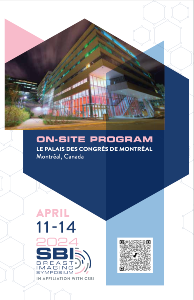Implementation of a novel approach to breast cancer risk assessment in the breast imaging setting
ePosters
- SR
Sean Raj, MD
Chief Innovation Officer
SimonMed Imaging
Presenter(s)
Purpose: Hereditary cancer risk assessment (HRCA) with comprehensive genetic testing plays a critical role in accurately assessing breast cancer risk. Many patients do not undergo risk assessment or genetic testing due to operational barriers, including lack of testing entry points and incomplete care continuity. Radiology centers are primary points of care for breast cancer risk assessment for some women, and integrated screening processes at breast imaging centers could help eliminate numerous barriers. Here we describe the preliminary implementation of a novel approach to breast cancer risk assessment in breast radiology settings, leveraging digital innovation tools to identify patients eligible for genetic testing.
Materials and Methods: Patients visiting participating breast imaging centers for mammography screening were invited to receive imaging center intake forms, including HRCA using an interactive digital tool available either in-office or at home. Based on assessment responses, patient eligibility for genetic testing and/or supplemental imaging was determined. Pre-/post-test patient education with certified genetic counselors was available to qualifying patients. Patient utilization data were collected for each step in the HRCA and genetic testing process.
Results: From April 26–September 30, 2023, 5,985 patients visiting 4 imaging centers for mammography were invited to complete interactive digital assessments. Overall, 5,297 (88.5%) patients started assessments, and 4,599 patients completed assessments (86.8% of those who started assessments). Among patients who completed assessments, 2,522 (54.8%) completed them at healthcare facilities and 2,077 (45.2%) completed them in advance at home. Interactive digital assessments took 12.1 minutes on average to complete. Among screened patients, 1,184 (26%) met genetic testing criteria based on national guidelines. Pre-test patient education was offered to all qualifying patients, and 156 (13.1%) participated in such consultations. In total, 248 patients (21% of patients who met testing criteria) proceeded with testing.
Conclusion: Radiology centers can utilize digital innovation tools to perform in-depth assessments of patient breast cancer risk and genetic testing eligibility, offer pre-test patient education, and facilitate genetic testing among patients presenting for annual mammography screening. Such tools can help overcome operational barriers that reduce access to testing that is essential for accurate breast cancer risk assessment.
Clinical Relevance Statement: Integrated workflows combining risk assessment and imaging-based screening could help identify women with elevated breast cancer risk, facilitate genetic testing, and subsequently direct patients to additional recommended imaging. These processes could help overcome operational barriers by connecting women to care they would not otherwise receive and reduce cancer outcome disparities.
Materials and Methods: Patients visiting participating breast imaging centers for mammography screening were invited to receive imaging center intake forms, including HRCA using an interactive digital tool available either in-office or at home. Based on assessment responses, patient eligibility for genetic testing and/or supplemental imaging was determined. Pre-/post-test patient education with certified genetic counselors was available to qualifying patients. Patient utilization data were collected for each step in the HRCA and genetic testing process.
Results: From April 26–September 30, 2023, 5,985 patients visiting 4 imaging centers for mammography were invited to complete interactive digital assessments. Overall, 5,297 (88.5%) patients started assessments, and 4,599 patients completed assessments (86.8% of those who started assessments). Among patients who completed assessments, 2,522 (54.8%) completed them at healthcare facilities and 2,077 (45.2%) completed them in advance at home. Interactive digital assessments took 12.1 minutes on average to complete. Among screened patients, 1,184 (26%) met genetic testing criteria based on national guidelines. Pre-test patient education was offered to all qualifying patients, and 156 (13.1%) participated in such consultations. In total, 248 patients (21% of patients who met testing criteria) proceeded with testing.
Conclusion: Radiology centers can utilize digital innovation tools to perform in-depth assessments of patient breast cancer risk and genetic testing eligibility, offer pre-test patient education, and facilitate genetic testing among patients presenting for annual mammography screening. Such tools can help overcome operational barriers that reduce access to testing that is essential for accurate breast cancer risk assessment.
Clinical Relevance Statement: Integrated workflows combining risk assessment and imaging-based screening could help identify women with elevated breast cancer risk, facilitate genetic testing, and subsequently direct patients to additional recommended imaging. These processes could help overcome operational barriers by connecting women to care they would not otherwise receive and reduce cancer outcome disparities.

